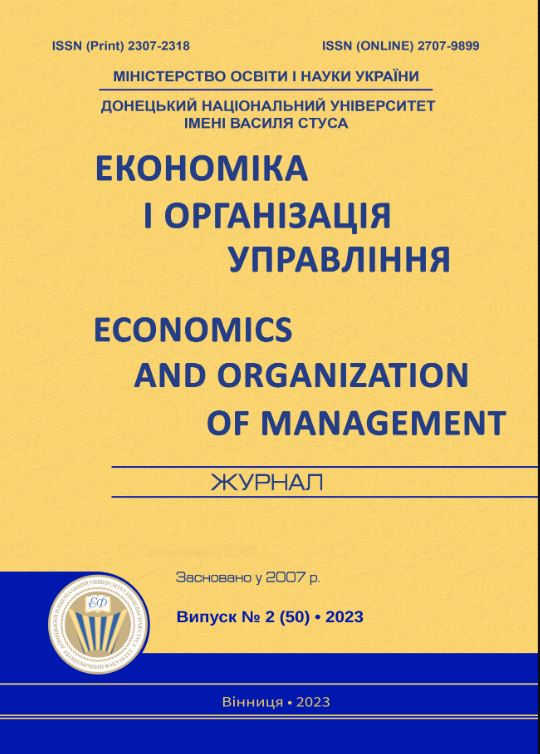Alternative development strategies of post-industrial societies in the conditions of neo-industrial modernization of the world economy
DOI:
https://doi.org/10.31558/2307-2318.2023.2.11Keywords:
development strategy of post-industrial societies; neo-industrial modernization of the world economy; policy of neo-industrialization; transitive economy; automation; robotization; technological systemsAbstract
The work identifies alternative ways of building strategies for the development of post-industrial societies in the conditions of neo-industrial modernization of the world economy, provides a description of the features of the policy of neo-industrialization for countries with a transitive economy, and forms the primary tasks of the neo-industrialization strategy of Ukraine. The basic principles of the development strategy of post-industrial societies in the conditions of neo-industrial modernization of the world economy, which has economic and social components, are defined.
It is concluded that the "anti-crisis strategy of postmodernism" is relevant for post-industrial and transitive economies in the context of their further industrial development, in the forms of re-industrialization or neo-industrialization.
It was determined that the policy of neo-industrialization involves the orientation of industry towards highly efficient technological processes during the introduction of process, technological, managerial, and organizational innovations, the construction of global value chains, the intellectualization of production activities, the digitalization of all systems and areas of management, orientation towards environmental friendliness, energy efficiency, and thriftiness of production, while at the same time increasing the quality of life and social protection of the population.
The basic branches of industry open the way to the development of a post-industrial society due to the residual competitive potential, which can be quickly and with moderate investments "rebooted" so that they become self-sustaining and turn into "locomotives" for the further growth of all related industries, and generate local multiplier cycles of turnover capital for average regional waves of development. Other positive consequences will be an increase in labor productivity, rationalization of consumption of raw resources, improvement of the environmental condition of the natural environment, and the urban microclimate.
As the main feature of the development strategy of post-industrial societies, neo-industrialization is a new intellectual and innovative basis of computerization and informatization of the economy, through the transition to post-industrial technologies, an intermediate stage on the way to the "intellectual, information economy".
The priority tasks of Ukraine's neo-industrialization strategy have been formed in the form of funding of scientific research, state guarantee of investments in R&D with effective and large-scale measures to combat corruption, tax evasion, and reducing the level of economic marginalization, which will ensure its transition to the implementation of a new industrial-technological and social policy. to the post-industrial stage of development.
References
Таранич А.В. Феномен постіндустріального суспільства та основні концепції його розвитку. Економіка і організація управління: Збірник наукових праць. Вінниця: ДонНУ імені Василя Стуса, 2017. Вип. 1 (25). 203 с. С. 133-139 http://jeou.donnu.edu.ua/article/view/3987
Ляшенко В. І., Котов Є. В. Україна ХХІ: неоіндустріальна держава або «крах проекту»?: монографія. НАН України, Ін-т економіки пром-сті; Полтавський ун-т економіки і торгівлі. Київ, 2015. 196 с. URL iie.org.ua/wp-content/uploads/monografiyi/2015/2015_mono_Lyashenko_Kotov.pdf
Лепа Р.Н., Охтень А.А., Прокопенко Р.В. Управление развитием промышленных предприятий в условиях неоиндустриализации: механизм, модели и методы: моногр.; под общ. ред. Р.Н. Лепы. НАН України, Ін-т економіки пром-сти. Киев, 2016. 162 с.
Таранич А. В. Стратегії економічного зростання країн в контексті глобальних викликів розвитку світового господарства. Вісник економічної науки України. 2020. № 1 (38). С. 52-57. doi: 10.37405/1729-7206.2020.1(38).52-57
Таранич А. В. Вплив глобальних викликів сучасності на особливості та перспективи розвитку світового господарства Вісник Хмельницького національного університету. Економічні науки. 2020. № 3. С. 160-166. doi: 10.31891/2307-5740-2020-282-3-30
Омельченко В. Я., Кузнєцов В. Г., Таранич А. В., Громенкова С. В. Міжнародний маркетинг: навч. посібник для студентів вищих навчальних закладів. Вид. 3-тє, допов. Вінниця: ДонНУ, 2018. 285 с.
Таранич А. В. Тренди та виклики глобального конкурентного середовища: трансформація світового лідерства. Трансформація соціально-економічних систем в умовах викликів глобального сталого розвитку: монографія; за. заг. ред. Т. В. Орєхової. Вінниця: ТВОРИ, 2021. 432 с. С. 28-50

